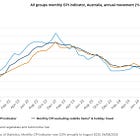Media Organizations Must Combat Online Misinformation as Australians Turn to Social Platforms for News, Report Finds
Today’s Article is brought to you by Empower your podcasting vision with a suite of creative solutions at your fingertips.
This piece is freely available to read. Become a paid subscriber today and help keep Mencari News financially afloat so that we can continue to pay our writers for their insight and expertise.
Australian news organizations bear critical responsibility for debunking online fake news and conspiracy theories that cause real-world harm as citizens increasingly rely on social media platforms for information, according to an exclusive industry report released by La Trobe University.
The comprehensive study, “Facebook and the News Media: How Australians Engage with News and Misinformation Online,” analyzed more than three million posts from 25 Australian news publishers over 15 years using exclusive access to Meta’s Content Library to examine how misinformation spreads across social platforms.
“As audiences increasingly rely on social media for news, the media’s responsibility to signal credible information and counter misinformation is critical to limiting its spread,” the report states.
The findings reveal a fundamental shift in news consumption patterns, with media organizations becoming increasingly dependent on social media platforms, particularly Meta’s Facebook, to reach Australian audiences.
Truth matters. Quality journalism costs.
Your subscription to Mencari directly funds the investigative reporting our democracy needs. For less than a coffee per week, you enable our journalists to uncover stories that powerful interests would rather keep hidden. There is no corporate influence involved. No compromises. Just honest journalism when we need it most.
Not ready to be paid subscribe, but appreciate the newsletter ? Grab us a beer or snag the exclusive ad spot at the top of next week's newsletter.
Misinformation Proves ‘Particularly Sticky’
The research identified social media as a powerful tool for misinformation dissemination, with false information proving “particularly sticky” and capable of flourishing and spreading rapidly across platforms.
Data analysis revealed misinformation spreads especially during Australian elections, where conspiracy theorists make false claims about electoral processes. The pattern demonstrates how misleading content gains traction during periods of heightened political engagement.
“Misinformation is especially spread during Australian elections, where conspiracy theorists make false claims about electoral processes,” the report found.
Professor Andrea Carson, who led the study as Associate Dean of Research, Industry and Engagement at La Trobe University, emphasized the real-world consequences of unchecked misinformation.
“The research underscores the real-world consequences of misinformation and the harms it may cause especially in health and public trust in institutions and organizations such as charities,” Carson said. “Containing this spread is critical for healthy democracies, societies and individuals.”
Political Figures Drive Misinformation Spread
The study identified public figures, particularly politicians, as key players in spreading misinformation across social platforms. Data showed misleading statements from political elites are readily picked up and amplified by the public, creating cascading effects of false information.
However, the research also noted political figures can play important roles in curbing misinformation when they communicate accurately.
“While mitigation measures such as factchecking and Meta’s efforts to limit the spread of false content can curb misinformation, political figures are largely exempt from these policies,” the report states. “This highlights the critical responsibility of political elites to communicate truthfully and avoid fuelling misinformation.”
The finding underscores a gap in current content moderation approaches, where standard fact-checking measures apply to ordinary users but often exclude political figures from similar scrutiny.
News Consumption Patterns Shift Dramatically
The analysis revealed significant changes in audience engagement patterns over the past decade. Arts and lifestyle posts now generate the most engagement for news organizations, representing a complete reversal from 10 years ago when political stories dominated social media interaction.
Carson noted this shift reflects broader changes in how Australians consume news content online, with audiences gravitating toward lighter content while still accessing political information through different pathways.
The data identified a notable “bump” in 2016 marking the point when news organizations significantly increased content sharing through social media platforms, indicating when the industry recognized social platforms as essential distribution channels.
Academic Research Breaks New Ground
Carson is among a handful of academics globally authorized to access Meta’s newly established Content Library, providing unprecedented insight into social media news distribution patterns.
The research team included Dr. Justin Phillips, Senior Lecturer in Political Science at the University of Waikato in New Zealand, and Phoebe Hayman, a PhD candidate in the department of Politics, Media and Philosophy at La Trobe University.
The comprehensive analysis examined how content is distributed, how audiences engage with news topics, and the nature of misinformation and disinformation spread across Australian social media platforms.
Industry Transformation Documented
The study documented the fundamental transformation of Australia’s news industry, showing how traditional media outlets adapted to digital-first distribution models centered on social media engagement.
News organizations demonstrated increasing sophistication in tailoring content for social media consumption, with successful posts requiring different approaches than traditional print or broadcast formats.
The research highlighted both opportunities and vulnerabilities in the current media landscape, where social platforms provide unprecedented reach but also enable rapid spread of misleading information.
Methodology Provides Comprehensive Analysis
The study’s methodology involved analyzing posting patterns, engagement metrics, and content classification across 15 years of Australian news media social media activity. Researchers examined both quantitative engagement data and qualitative content analysis to identify misinformation patterns.
The 25 participating news publishers represented a cross-section of Australian media, from major metropolitan newspapers to regional outlets and digital-native organizations.
Meta’s Content Library provided access to historical data typically unavailable to external researchers, enabling longitudinal analysis of trends and patterns in news distribution and misinformation spread.
Professional Journalism Role Emphasized
The report emphasized the vital role of professional journalists and media organizations in reporting daily events and informing the public through online channels.
Researchers argued that professional news outlets serve as crucial gatekeepers in the digital information ecosystem, with responsibility extending beyond traditional reporting to active misinformation counter-narratives.
“The findings underscore the vital role of professional journalists and media organisations in reporting daily events and informing the public online,” the report states.
The study suggested news organizations must evolve their practices to include proactive fact-checking, myth-busting, and educational content that helps audiences distinguish reliable information from misinformation.
Health and Democratic Implications
Carson’s research team identified particular concerns about misinformation’s impact on public health information and democratic institutions. False information in these areas creates measurable harm to individual and societal wellbeing.
The report documented how conspiracy theories and misleading health information spread through social networks, often outpacing corrective information from authoritative sources.
Trust in charitable organizations, government institutions, and public health authorities showed vulnerability to sustained misinformation campaigns, according to the research findings.
Research Funding and Independence
The report was produced with research grant support from Meta Australia, with authors acknowledging both Meta’s support and the Inter-university Consortium for Political and Social Research at the University of Michigan for facilitating Content Library access.
The funding arrangement enabled unprecedented access to platform data while maintaining academic independence in research design and analysis.
The study represents one of the first comprehensive academic examinations of Australian news media’s social media engagement patterns using platform-provided data spanning more than a decade.
The research provides baseline data for understanding how misinformation spreads through social networks and identifies potential intervention points for reducing harmful false information circulation across Australian digital media landscapes.
The report can be found here
Sustaining Mencari Requires Your Support
Independent journalism costs money. Help us continue delivering in-depth investigations and unfiltered commentary on the world's real stories. Your financial contribution enables thorough investigative work and thoughtful analysis, all supported by a dedicated community committed to accuracy and transparency.
Subscribe today to unlock our full archive of investigative reporting and fearless analysis. Subscribing to independent media outlets represents more than just information consumption—it embodies a commitment to factual reporting.
As well as knowing you’re keeping Mencari (Australia) alive, you’ll also get:
Get breaking news AS IT HAPPENS - Gain instant access to our real-time coverage and analysis when major stories break, keeping you ahead of the curve
Unlock our COMPLETE content library - Enjoy unlimited access to every newsletter, podcast episode, and exclusive archive—all seamlessly available in your favorite podcast apps.
Join the conversation that matters - Be part of our vibrant community with full commenting privileges on all content, directly supporting The Evening Post (Australia)
Catch up on some of Mencari’s recent stories:
It only takes a minute to help us investigate fearlessly and expose lies and wrongdoing to hold power accountable. Thanks!







